
Stakeholders in the maritime industry have voiced specific concerns regarding the prospects and challenges facing Nigeria’s blue economy. Key issues highlighted include the depletion of marine resources, unsustainable practices, policy gaps, review of the Cabotage Law, among others. They submitted that the issues impede the full realization of the Nigerian maritime sector’s potential.
Speaking with the former Director of Regulation and Enforcement, Council for the Regulation of Freight Forwarding in Nigeria (CRFFN), Mr. Basil Opara, he emphasized the need for a new strategy to address ongoing challenges that threaten the sustainability of the marine domain.
Contrary to misconceptions, Opara clarified that the blue economy is not a new industry, but rather a concept rooted in resource conservation. He stressed that a cleaner ocean would contribute to economic growth, creating opportunities and jobs for the youth.
While characterizing the blue economy as a sustainable approach to the maritime domain, Opara expressed concerns about the ongoing depletion of the seas, due to activities such as sea pollution, leading to the transformation of the blue economy into a “brown” state.
Opara attributed it to lack of replenishment and responsible practices. He warned that without concerted efforts, the sea risks being depleted, jeopardizing the future of the nation’s maritime domain.
The former CRFFN Director emphasized that technology and equipment are necessary to explore and harness resources found in deeper waters. He argued that the potential of the blue economy in Nigeria differs from other nations, necessitating a tailored approach to address depletion.
Opara called for the application of a new strategy in the maritime domain, one that prioritizes the preservation and sustainability of the ocean. He cautioned against the unchecked removal of resources, stressing the need to preserve the ocean for future generations.
In his words: “The blue economy is just a sustainable approach to the maritime domain. Over the years, the Captains for the seas have been carting away with the benefits of the oceans with no replenishment.
“The idea of removing sand dunes and all these small fishes at the seashore in the name of crayfish and others is absurd. These are things that become the big fish tomorrow. Any country that has no youth has no future, the same thing with the marine domain. If you don’t have and preserve the fingerlings that will turn to fishes, then seas will be depleted. The Blue Economy is all about the economy gotten from the oceans. Unfortunately the blue economy has turned to Brown.
“We need to apply a new strategy to the maritime domain, a strategy that will preserve the ocean and make it sustainable. If you remove all the resources and they don’t grow again, how do you preserve the ocean? Let us preserve the one we have and sustain it for the future. If we don’t preserve it, it will deplete and when it depletes, the future will become gloomy” Opara cautioned.
Also speaking, the Chairman of Institute of Chartered Shipbrokers (ICS), Dr Chris Ebare voiced concerns about the underutilization of resources in Nigeria’s blue economy, emphasizing the need for policy reforms to tap into its full potential.
Acknowledging the positive impact of the blue economy on shippers and its role in revenue generation for the country, Dr Ebare drew attention to the huge revenue loss in the blue economy of Nigeria while advocating for a comprehensive review of the Cabotage Law.
Dr Ebare argued that a thorough revision of the Cabotage law would unlock untapped resources and contribute to the growth of the maritime economy. Additionally, he suggested reversing the Free On Board (FOB) documentation of ships to Gross Insurance and Freight (GIF) for more effective shipping operations within the country.
Expressing dissatisfaction with the current state of the Shipping Development Department at the Nigeria Maritime Administration and Safety Agency (NIMASA), Ebare revealed that many ship owners prefer registering their vessels outside Nigeria, leading to a loss of revenue for the country. He urged a re-evaluation of the department’s effectiveness and suggested reforms to encourage domestic ship registration.
The Chairman of ICS emphasized the crucial role of the maritime sector in servicing the oil and gas industry. To enhance the sector’s efficiency, he called for the injection of professionals into the ministry. According to Ebare, a ministry staffed with professionals would display expertise that could substantially boost the overall economy.
“We can see the impact of the blue economy among shippers in terms of revenue generation for the country. However, there are lots of resources and revenue we are losing from the blue economy. First, I would like to advocate that the Cabotage Law is fully reviewed in order to fully tap into these resources and open up the maritime economy”.
On his part, the National Secretary of the Association of Registered Freight Forwarders of Nigeria (AREFFN), Mr Frank Obiekezie applauded the creation of a dedicated ministry, highlighting the significance attached to the blue economy.
While acknowledging the government’s commitment by establishing a dedicated ministry for the blue economy, he highlighted the need for organized strategies, stakeholder engagement, and targeted policies to overcome existing challenges.
However, Obiekezie expressed reservations about Nigeria’s current level of involvement in the blue economy, citing the absence of domestically- owned vessels. According to him, the inadequate management of Nigeria’s waters poses a significant challenge to realizing the full potential of the blue economy.
While recognizing the blue economy as a potential billion-dollar industry, Obiekezie cautioned against unrealistic ambitions, especially the idea of establishing a national shipping line. He described such a venture as a grandiose project, primarily viable on paper, but questioned its practicality given Nigeria’s historical challenges with corruption in government-driven businesses.
“Jumping into floating a national line is a grandiose project. It is only good on paper. But in reality, as I have always maintained, the Nigerian government has no business; going from our antecedents. It’s obviously full of corruption”, Obiekezie concluded.















